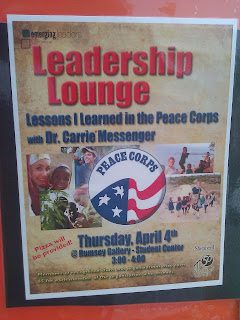For my final Cultural Event, I attended a Leadership Lounge Workshop titled "Lessons I Learned in the Peace Corps," a lecture by Shepherd English professor, Dr. Carrie Messenger. The lecture started off with Carrie describing how her family had always been into the Peace Corps, what it is all about, and how she got involved. I learned that it is a two year commitment. The Peace Corps works in countries from Central America to Asia and Europe to Africa. In each set countries, volunteers work with schools, entrepreneurs, governments, health, business, information technology, and environment. When Dr. Messenger joined, she committed to teaching and wasn't sure which country she would be placed in. She described how at 22, she hadn't had any previous experience speaking any other language than German and got placed in a village in Moldova, a republic located in between Romania and the Ukraine. She mentioned how the language was the most difficult part about the experience, but that there were not many other ways to experience travel with someone else paying the way Peace Corps does. In the village, Dr. Messenger taught students who took onto her quite well. She mentioned funny stories of how she was kind of like a celebrity of the village she was placed in as her students were interested in her as an American willing to help.
 |
| Flyer in front of the Rumsey Room |
Dr. Messenger explained how she received a living stipend for her village and how she got by on a little over $300 each month. She explained how it was exciting to do simple things like purchase stamps, take villagers out to have a Coke, and find oranges because they were rare and expensive in the market. She explained how she used to save up to buy oranges because she disliked potatoes which are richly loved in Moldova. When asked how much of an impact she thought she had on her village, she mentioned how Peace Corps actually made more of an impact on her than it did the village she served in. She mentioned how she is also still in touch with her host family and students in Moldova even though she served over 12 years ago. Carrie even explained how most teachers only got paid in sugar, so they would stop teaching because they couldn't pay for anything.
I was handed a note card in the beginning so that I could ask her the following question: Were there any things that you found to be universal or true for all people based on your experiences? Dr. Messenger kindly answered my question by telling me how she would attempt telling jokes in the Romanian language and how humor can connect the humankind. As many life lessons were learned, Peace Corps is commonly known as "the toughest job that you'll love to do." Dr. Messenger's lecture changed me in a sense that I have considered joining Peace Corps in a means to give back to the world. She mentioned how much of a privilege it was to have become so fluent in the Romanian language simply by experiencing it for a full two years. Dr. Messenger also translates Romanian literature now. She mentioned how she wouldn't have been able to do that without the experience.

